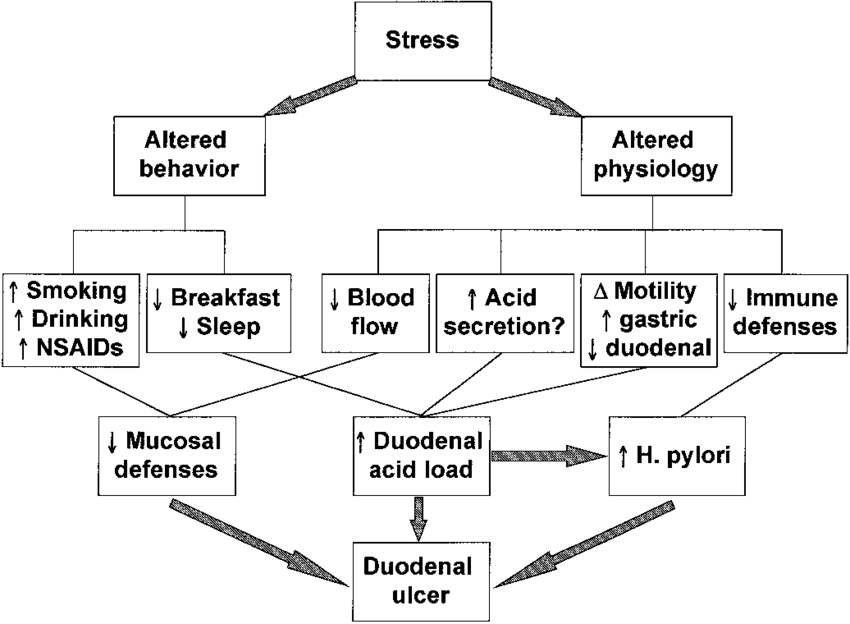
Peptic ulcers are open sores that develop on the lining of the stomach or the first part of the small intestine. While the primary causes of ulcers are infections, particularly by Helicobacter pylori (H. pylori), and the use of nonsteroidal anti-inflammatory drugs (NSAIDs), stress has also been identified as a significant factor contributing to ulcer formation and exacerbation of symptoms. This blog explores the relationship between stress and ulcers, how stress exacerbates symptoms, stress management techniques, and the importance of a balanced lifestyle.
The Relationship Between Stress and Ulcers
For many years, the link between stress and ulcers was a topic of debate. However, recent research has shed light on how stress can influence the development and healing of peptic ulcers. Stress does not directly cause ulcers, but it can contribute to their formation and exacerbate existing conditions.
- Physiological Response: When a person experiences stress, the body triggers a fight-or-flight response, releasing hormones like cortisol and adrenaline. These hormones can increase stomach acid production and affect blood flow to the stomach lining, making it more susceptible to damage.
- Behavioral Factors: Stress often leads to changes in behavior that can negatively impact digestive health. Individuals may resort to unhealthy coping mechanisms such as poor eating habits, smoking, excessive alcohol consumption, and neglecting proper self-care, all of which can contribute to ulcer formation or worsen symptoms.
How Stress Exacerbates Symptoms
Stress can exacerbate the symptoms of peptic ulcers in several ways:
- Increased Acid Production: Under stress, the body produces more gastric acid, which can irritate the ulcer and lead to increased pain and discomfort.
- Reduced Immune Function: Chronic stress can weaken the immune system, making it harder for the body to combat infections, including H. pylori, which is a primary cause of ulcers.
- Delayed Healing: Stress can slow down the healing process of existing ulcers, prolonging symptoms and discomfort.
- Increased Sensitivity to Pain: Stress can heighten a person’s sensitivity to pain, making ulcer-related discomfort feel more intense and difficult to manage.
Stress Management Techniques
Managing stress effectively is essential for individuals with peptic ulcers. Incorporating stress management techniques into daily life can help reduce symptoms and promote healing. Here are some effective strategies:
1. Meditation and Mindfulness
Practicing meditation and mindfulness can help calm the mind and reduce stress levels. These techniques encourage relaxation and focus on the present moment, which can be particularly beneficial for individuals dealing with chronic pain or discomfort.
2. Regular Exercise
Physical activity is a powerful stress reliever. Engaging in regular exercise can improve mood, boost endorphin levels, and promote overall well-being. Activities such as walking, swimming, yoga, or cycling can be particularly effective for reducing stress.
3. Deep Breathing Exercises
Deep breathing exercises can help alleviate stress by promoting relaxation. Techniques such as diaphragmatic breathing or the 4-7-8 method can help individuals manage anxiety and improve their emotional well-being.
4. Social Support
Connecting with friends, family, or support groups can provide emotional support and help individuals cope with stress. Talking about feelings and experiences can alleviate feelings of isolation and anxiety.
5. Healthy Coping Strategies
Encouraging healthy coping strategies, such as journaling, engaging in hobbies, or practicing self-care, can help individuals manage stress more effectively.
Encouraging a Balanced Lifestyle
A balanced lifestyle is essential for both physical and mental well-being. For individuals dealing with ulcers, maintaining a healthy balance can support overall health and reduce stress levels. Here are some tips for achieving a balanced lifestyle:
- Balanced Nutrition: Eating a well-balanced diet rich in fruits, vegetables, whole grains, lean proteins, and healthy fats can support overall health and promote healing. Avoiding trigger foods that exacerbate ulcer symptoms is also crucial.
- Adequate Sleep: Prioritizing sleep is vital for stress management and overall health. Aim for 7-9 hours of quality sleep each night to support physical recovery and emotional resilience.
- Time Management: Practicing effective time management can help reduce feelings of overwhelm. Prioritize tasks, set realistic goals, and take breaks to recharge throughout the day.
- Engagement in Leisure Activities: Taking time to engage in enjoyable activities and hobbies can provide a sense of purpose and fulfillment, helping to alleviate stress.
- Mind-Body Practices: Incorporating practices such as yoga, tai chi, or qigong can promote relaxation, flexibility, and strength while reducing stress levels.
Conclusion
Stress plays a significant role in the development and exacerbation of peptic ulcers. By understanding the connection between stress and ulcers, individuals can take proactive steps to manage their stress and promote healing. Implementing effective stress management techniques and adopting a balanced lifestyle can significantly improve overall well-being and reduce ulcer symptoms. If you are struggling with ulcers or stress, consult a healthcare professional for guidance on developing a personalized management plan that addresses both physical and emotional health. Taking charge of your stress and well-being can pave the way for a healthier, more fulfilling life.

